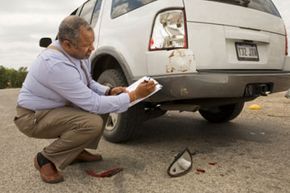Driving a car provides freedom and convenience, but it's also a huge responsibility. That's why it's the law to have an auto insurance policy if you're a registered car owner. If a driver gets into an accident, auto insurance is a "rainy day" fund -- it pays for car repairs, medical bills, legal fees and even rental fees for a replacement car for you and maybe other drivers involved in the collision. Without insurance, the driver risks the tremendous financial burden of paying for everything out of pocket.
Drivers usually sign a six-month policy with an auto insurance policy. Each month, or all at once, the driver pays a fee, or premium, to the company. There are a few things that determine the cost of the policy: the type of car insured (particularly its safety record and how expensive it is to repair) the driver's record (the more speeding tickets the driver has incurred, the riskier he is) and even age (teenagers cost more to insure because they're less experienced drivers, and therefore a bigger risk.) Lower-cost premiums are enjoyed by drivers with fewer accidents and tickets on their records, part-time drivers, people who take driver education courses, and families with multiple cars.
Advertisement
How insurance companies determine how much each driver will pay, along with how much they'll pay out for each and every driver making a financial "claim" to cover expenses when an accident happens, is a complex process. Read on to find out how insurance companies are organized and why you pay what you pay each month.






